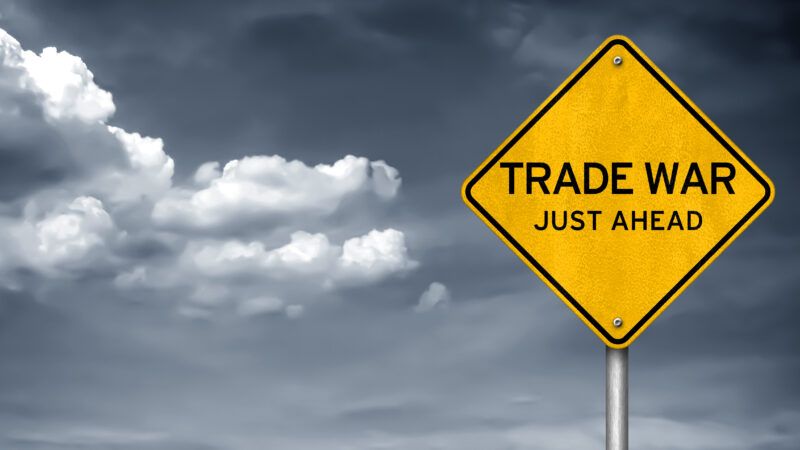Trump's Tariffs Will Make Americans, Mexicans, and Canadians Poorer
American tariffs will increase the price of final and intermediate goods, hurting our own consumers and domestic manufacturers.

President Donald Trump has floated 25 percent tariffs on Mexican and Canadian imports, set to take effect on February 1. If implemented, these tariffs wouldn't just hurt the Canadian and Mexican economies, but also make American consumers poorer and domestic manufacturers less competitive.
From January 2024 through September 2024, total trade between the U.S. and Mexico surpassed $700 billion, while trade with the U.S. and Canada came just short of that figure. Canada and Mexico are also America's two largest export markets: $325 billion and $275 billion worth of goods and services were sold to Canada and Mexico, respectively, over the first three quarters of 2024.
U.S.-levied tariffs would hurt all countries involved. Research conducted by the Peterson Institute for International Economics predicts that 25 percent tariffs on Canada and Mexico would decrease American gross domestic product (GDP) by $200 billion, Canadian GDP by $100 billion, and Mexican GDP growth by 2 percent. These tariffs would also diminish American manufacturing.
TD Economics finds that "most Canadian exports are inputs used by American businesses in their own production." Similarly, Mexico's third-largest export to the U.S. is intermediate goods for vehicles, according to the Observatory of Economic Complexity, a data visualization tool for international trade. Erecting tariffs on Canada and Mexico would not only increase the cost of goods enjoyed by American consumers but also increase the price of Canadian and Mexican inputs for American manufacturers, reducing the competitiveness of our exports internationally.
Trump's proposed tariffs have triggered responses from Mexican and Canadian officials. Canadian Prime Minister Justin Trudeau promised that his country would "respond to unfair tariffs in a number of ways." He has also cautioned the president, saying "Canada provides many of the necessary inputs the American economy is going to need in order to grow and boom," such as $170 billion worth of oil, natural gas, and power. Ontario Premier Doug Ford went further, directing the Liquor Control Board of Ontario to prohibit the sale of all American alcohol in the event that Trump follows through with his tariffs on February 1.
Mexican President Claudia Sheinbaum has avoided threatening the U.S. with retaliatory tariffs. However, Kenneth Smith Ramos, Mexico's chief negotiator in the United States-Mexico-Canada Agreement, warned that the American economy "relies on hundreds of billions of dollars in Mexican imports that boost the competitiveness of its manufacturing sector."
Trump would be well advised to heed warnings from America's neighbors and pursue a policy of bilateral free trade with them instead of a policy of mutual antagonism. Tariffs make American consumers poorer and American industry less competitive; there's no reason to adopt such an economically indefensible policy.


Show Comments (119)